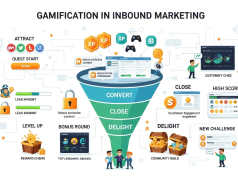Running a consulting business means you’re already an expert in your field. But being great at what you do doesn’t automatically translate to a steady stream of clients knocking down your door. That’s where a consultant in inbound marketing comes in.
Unlike traditional outbound methods that interrupt potential clients with cold calls and pushy sales tactics, inbound marketing attracts clients to you by providing genuine value. When done right, it positions you as the go-to authority in your niche while building trust with prospects long before they’re ready to hire anyone.
What Is Consultant Inbound Marketing?

Consultant inbound marketing is a strategic approach that focuses on attracting potential clients through valuable content and experiences tailored to their specific needs and challenges. Instead of interrupting people with advertisements, you create content that naturally draws your ideal clients to your business when they’re actively searching for solutions.
The methodology revolves around four key stages: attract, convert, close, and delight. First, you attract visitors through content marketing, SEO, and social media. Next, you convert those visitors into leads by offering valuable resources in exchange for their contact information. Then, you close leads into clients through targeted nurturing campaigns and consultative selling. Finally, you delight existing clients with exceptional service that turns them into advocates for your business. To learn how inbound marketing works hand-in-hand with SEO to boost visibility and attract qualified leads, check out our guide on Inbound Marketing and SEO.
For consultants, this approach is particularly powerful because it allows you to demonstrate your expertise while building relationships with potential clients over time. When someone finally decides they need help with the problems you solve, you’re already top of mind as the trusted expert who’s been providing value all along.
Why Inbound Marketing Works Particularly Well for Consultants
Consulting is fundamentally a relationship business built on trust and expertise. People don’t hire consultants based on flashy advertisements or aggressive sales pitches. They hire consultants they believe can solve their specific problems and deliver measurable results.
Inbound marketing aligns perfectly with how people actually buy consulting services. The typical buyer’s journey for consulting services is longer and more research-intensive than most other purchases. Decision-makers often spend months researching their options, reading case studies, and evaluating different approaches before making a decision.
During this extended research phase, your content becomes your sales team. Every blog post, white paper, and webinar you create is working around the clock to educate prospects and demonstrate your capabilities. By the time someone reaches out to you, they’re already pre-sold on your approach and expertise.
Additionally, consultant inbound marketing allows you to target very specific niches and problems. Unlike broad-based advertising, you can create content that speaks directly to the unique challenges faced by your ideal clients. This precision targeting helps you attract higher-quality leads who are more likely to convert into profitable client relationships.
Building Your Consultant Inbound Marketing Foundation
Before diving into tactics, you need to establish a solid foundation for your inbound marketing efforts. This starts with clearly defining your ideal client profile and understanding their specific challenges, goals, and decision-making process.
Create detailed buyer personas that go beyond basic demographics. What keeps your ideal clients awake at night? What metrics are they measured on? What obstacles prevent them from achieving their goals? The more specific you can get, the more targeted and effective your content will be.
Next, audit your current digital presence. Your website should position you as an authority in your field while making it easy for visitors to learn about your services and get in touch. Ensure your site loads quickly, looks professional on all devices, and includes clear calls-to-action throughout.
Your content strategy should align with your buyer’s journey. Create awareness-stage content that addresses broad industry challenges and trends. Develop consideration-stage content like case studies and comparison guides that help prospects evaluate different approaches. Finally, produce decision-stage content such as ROI calculators and implementation frameworks that help qualified prospects choose you over competitors.
Content Marketing Strategies That Drive Results
Content marketing forms the backbone of any successful consultant inbound marketing strategy. Your content serves multiple purposes: it attracts organic traffic from search engines, establishes your expertise, nurtures relationships with prospects, and supports your sales process.
Start by identifying the topics your ideal clients care about most. Use tools like Google Keyword Planner or SEMrush to research what your prospects are searching for online. Look for long-tail keywords that indicate commercial intent, such as “how to choose a [your specialty] consultant” or “best practices for [specific challenge you solve].”
Blog posts should provide actionable insights rather than generic advice. Share specific frameworks, tools, and strategies that readers can implement immediately. Include real examples from your experience without revealing confidential client information. The goal is to give away valuable knowledge that demonstrates your expertise while leaving room for prospects to need your help with implementation.
Case studies are particularly powerful for consultants because they provide social proof while illustrating your problem-solving approach. Structure your case studies around the challenge, solution, and results format. Be specific about the outcomes you achieved and include quantifiable metrics whenever possible.
White papers and research reports position you as a thought leader while generating qualified leads. These longer-form pieces allow you to dive deep into complex topics and showcase your analytical capabilities. Gate these premium assets behind lead capture forms to build your email list with highly engaged prospects.
SEO for Consulting Businesses

Search engine optimisation helps your content get discovered by prospects actively searching for solutions to their problems. For consultants, SEO is particularly valuable because people often search for very specific, niche topics related to their challenges.
Focus on long-tail keywords that indicate commercial intent rather than trying to rank for broad, competitive terms. For example, instead of targeting “marketing consultant,” focus on phrases like “B2B marketing consultant for SaaS companies” or “marketing strategy consultant for startups.”
Create pillar pages around your core service offerings and support them with related blog content. This topic cluster approach helps search engines understand your expertise while providing comprehensive resources for visitors interested in specific topics.
Local SEO matters for many consulting businesses, especially if you work primarily with clients in specific geographic regions. Optimise your Google My Business listing, encourage client reviews, and create location-specific content when relevant.
Technical SEO basics can’t be ignored. Ensure your website loads quickly, uses proper heading structures, and includes relevant meta descriptions for each page. While you don’t need to become an SEO expert, addressing these fundamentals will help your content perform better in search results.
Social Media and Thought Leadership
Social media platforms provide opportunities to engage directly with your target audience while amplifying your content reach. The key is choosing the right platforms based on where your ideal clients spend their time.
LinkedIn is typically the most valuable platform for B2B consultants. Share insights, comment thoughtfully on others’ posts, and participate in relevant group discussions. Use LinkedIn’s publishing platform to share longer-form content and establish yourself as a thought leader in your niche.
Don’t try to be everywhere at once. It’s better to be highly active and engaged on one or two platforms than to maintain a weak presence across multiple channels. Quality trumps quantity when it comes to social media engagement.
Thought leadership goes beyond just sharing your own content. Curate and comment on industry news, research, and trends. Offer unique perspectives on current events affecting your clients’ industries. This demonstrates that you stay current with developments in your field and can provide strategic insights beyond just tactical execution.
Lead Generation and Conversion Optimization
Converting website visitors into leads requires strategic placement of compelling offers throughout your site. Lead magnets should provide immediate value while demonstrating your expertise and approach to solving problems.
Effective lead magnets for consultants include templates, checklists, assessment tools, and industry reports. Make sure your offers are specifically relevant to your ideal clients’ most pressing challenges. A generic “10 Tips for Better Marketing” guide won’t be nearly as effective as “SaaS Startup Marketing Playbook: A Step-by-Step Guide to Your First 1,000 Customers.”
Landing pages for your lead magnets should be focused and distraction-free. Include compelling headlines, clear benefit statements, and minimal form fields. Test different versions to optimize conversion rates over time.
Email marketing allows you to nurture relationships with prospects who aren’t ready to buy immediately. Create automated sequences that provide ongoing value while gently moving prospects through your sales process. Share insights, case studies, and resources that help them better understand both their challenges and potential solutions.
Measuring and Optimizing Your Results
Track metrics that matter for your business goals rather than vanity metrics like social media followers or website traffic. Focus on measurements that indicate progress toward actual client acquisition and revenue generation.
Key performance indicators for consultant inbound marketing include lead generation rate, lead quality scores, email engagement rates, and, most importantly, the conversion rate from lead to client. Track how long it takes prospects to move through your sales process and identify bottlenecks that might be causing qualified leads to drop out.
Use Google Analytics to understand which content pieces generate the most qualified leads and which channels drive the highest-converting traffic. This data helps you double down on what’s working while eliminating or improving underperforming efforts.
Set up regular reporting schedules to review your progress and make data-driven adjustments to your strategy. Monthly reviews are typically sufficient for most consulting businesses, but you may want to check key metrics more frequently during the early stages of implementation.
Taking Your Consultant Inbound Marketing to the Next Level
Consultant inbound marketing isn’t a set-it-and-forget-it strategy. It requires consistent effort, ongoing optimization, and patience as you build momentum over time. The consultants who see the best results treat inbound marketing as a core business activity rather than something they do when they have spare time.
Start by implementing one or two tactics well rather than trying to execute everything at once. Master your content creation process and lead nurturing before adding complexity with additional channels or advanced techniques.
Remember that inbound marketing is a long-term strategy that compounds over time. The blog post you write today might generate leads for years to come. The relationship you build through valuable content now could result in a major client engagement months or years down the road.
Stay consistent with your efforts, focus on providing genuine value to your prospects, and measure what matters most for your business. With time and dedication, an consultant in inbound marketing can become your most reliable source of high-quality leads and profitable client relationships.




